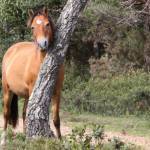Exploring the Welfare of Horses with Insect Bite Hypersensitivity

The current recommended treatment for insect bite hypersensitivity (IBH) is insect avoidance through protective blankets and stabling at peak insect activity periods. Still, this disease poses immense welfare issues, often leaving affected horses rubbing and itching incessantly.
IBH results from a hypersensitivity to the allergens in the saliva of biting insects, primarily Culicoides. While the pathogenesis of IBH has not been fully uncovered, experts know it involves a type I allergic reaction that results in immediate signs of allergy.
“For type I allergic reactions, the allergen stimulates the production of IgE antibodies, which subsequently bind to mast cells, causing the release of histamine, proteolytic enzymes, and other inflammatory mediators that cause severe itching and inflammation,” explained Catherine Whitehouse, M.S., of Kentucky Equine Research.
Scratching provides immense relief from the itch; however, it ultimately causes additional inflammation, pain, and trauma to the skin.
“Further, itching may contribute to poor animal welfare due to suffering and reduced quality of life, as observed in humans with pruritus,” Whitehouse said.
Acknowledging the impact of IBH on animal welfare, a study exploring the behaviors of horses with IBH was recently conducted at the Swedish University of Agricultural Sciences.*
Pairs of horses—one with IBH and one without—were included and maintained in the same paddock over two summers. Scratching behaviors of the horses were assessed using an ethogram (a catalog of behavior) that specifically identified rolling, shaking, scratching with teeth, scratching with head, scratching with leg, leg lifting, leg biting, and scratching against an object. Skin lesions were scored and assigned a grade based on severity, and skin biopsies were collected. Finally, horse movement was measured using an accelerometer that assessed overall activity, number of steps, and time spent lying down.
Data collected from both summers revealed that IBH was not associated with increased movement or itching behaviors as one might have expected. However, IBH horses were fitted with protective blankets during the study and an experimental nontoxic, environmentally friendly insect repellent was used. Thus, the IBH horses were “treated” during the study. Further, several horses were sold or euthanized between the first and second summers of the study (potentially because of the IBH), resulting in a small sample size included in the study, which may have affected the results.
What the researchers did notice was that even with blanketing and using the experimental insect repellent, IBH horses still had skin lesions associated with scratching.
The lesions indicated that the horses had been scratching even though they weren’t directly observed doing so. Thus, the observation periods may have been too short for the researchers to note scratching behaviors.
When itching was observed, it occurred more frequently in the evenings, which agrees with entomological studies that report Culicoides are most active just after sunset.
Itching was also observed in non-IBH horses, but those horses had low lesion scores and no evidence of hair loss or skin abrasions.
“This study demonstrated that IBH horses did itch and cause skin trauma, especially in the evenings, despite blanketing and using an experimental insect repellent. Even short-term exposure to Culicoides should be avoided to improve the welfare of IBH affected horses,” remarked Whitehouse.
When insect avoidance cannot be fully achieved and signs of IBH develop, supplementing affected horses with polyunsaturated fatty acids (EPA, DHA, and GLA) may be beneficial.
“ReSolvin EQ, one of Kentucky Equine Research’s newest scientifically formulated products, contains potent anti-inflammatory compounds that support the immune system,” said Whitehouse.
ReSolvin EQ contains a combination of long-chain omega-3 fatty acids and omega-6 fatty acids that provide additive and functional health benefits to horses. These benefits are not observed with other sources of polyunsaturated fatty acids (PUFAs), such as flaxseed oil.
“Studies at Kentucky Equine Research have shown reductions in oxidative stress and inflammatory markers when feeding long-chain omega-3 fatty acids (EO-3) and a blend of polyunsaturated fatty acids (ReSolvin EQ). Therefore, in addition to implementing key management strategies to promote horse comfort during insect season, make sure you are providing a well-balanced diet and consider additional PUFA-based supplementation,” recommended Whitehouse.
*Söderroos, D., R. Ignell, P. Haubro Andersen, K. Bergvall, and M. Riihimäki. 2023. The effect of insect bite hypersensitivity on movement activity and behaviour of the horse. Animals (Basel) 13(8):1283.








